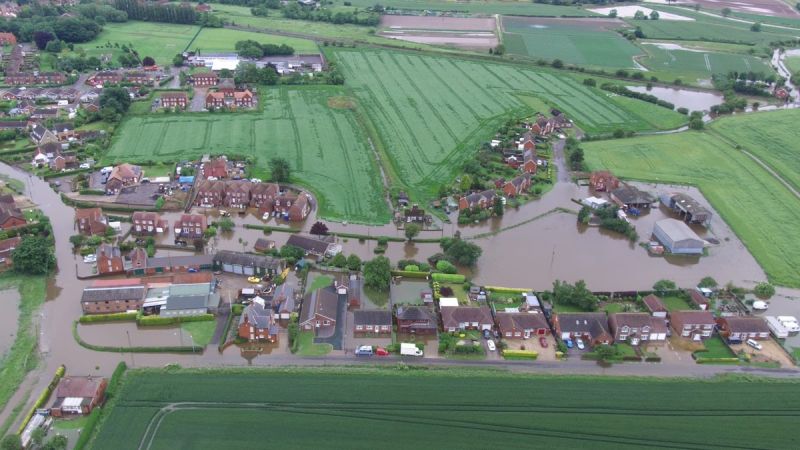
A farmer may lose half his crop following recent flooding in Lincolnshire which has also seen people evacuated from their homes.
In Wainfleet, a small town in Lincolnshire, around 600 homes had to be evacuated after torrential downpour.
Lincolnshire Police confirmed that people will not be able to return to their homes until at least Monday.
It follows the River Steeping bursting its banks last Wednesday after the town received double the average monthly rainfall in just three days.
A round up of our @lincspolice drone, dawn to dusk tasking supporting @envagency @LIncsfirerescue with a real time flood imaging from above in #wainfleet. Finding the most effective locations for High Volume Pumps. #policingwithpride @LincsSpecials #Lincolnshirefloods pic.twitter.com/XEtKEUN5hQ
— Lincolnshire Police Drones (@lincsCOPter) June 17, 2019
And one local farmer may have to write-off up to half his crop following the severe weather.
Paul Willoughby, who grows oilseed rape and wheat, is expecting a heavily reduced yield this harvest.
He told ITV News his crops are 'dying off', and half a yield is now the 'best case scenario'.
“The flag leaf should be filling the grain. It should be vibrant green, but is starting to go brown,” Mr Willoughby said.
Lindsey Marsh Drainage Board (LMDB), the local internal drainage board, said it has highlighted the town's poor flood defences for 20 years.
Chairman of the LMDB, Giles Crust told BBC News: “We have been telling the Environment Agency for 20 years that this will happen, but forcefully for the last eight years we have been banging the drum that that wall will collapse,” he said.
“It should never have happened in the first place. That bank should have been safe.”
Elsewhere in Lincolnshire, Fen Peas Ltd, which grows 5,000 acres worth of peas, shared a video on social media showing the devastating floods.
The company said the situation is 'devastating and soul destroying'.
Devastating and soul destroying. pic.twitter.com/GSfzxl1liI
— Fen Peas Ltd (@FenPeasLtd) June 13, 2019
The Met Office issued a yellow warning for parts of the East of England on Wednesday (19 June) following days of heavy rain and thunderstorms.
The NFU recently urged the government to take the impact of flooding on the farming industry and food production more seriously.
Some of the UK's most productive farmland lies in floodplains or coastal regions, vulnerable to flooding.
The farming union says agricultural land deserves to be protected in the same way urban areas are.
